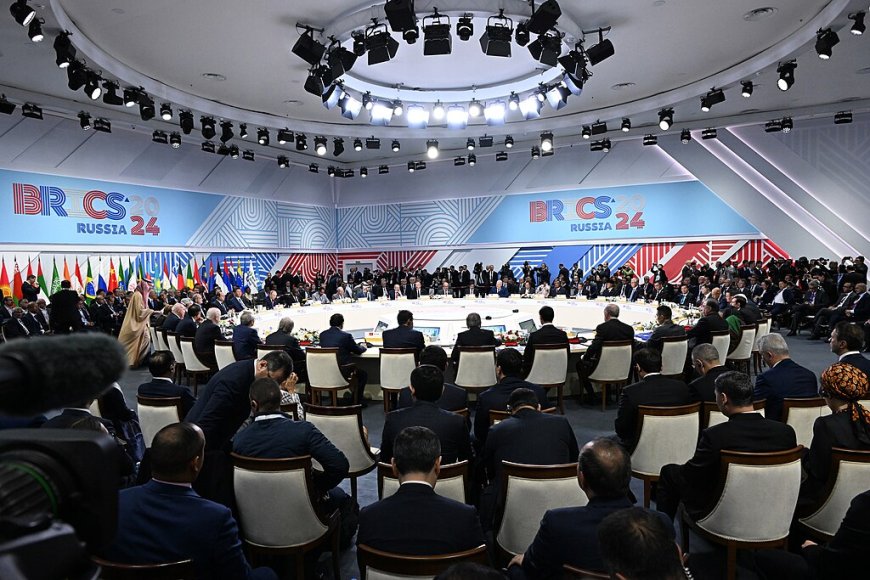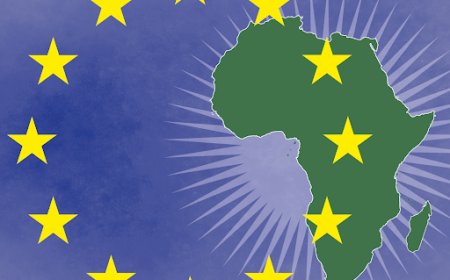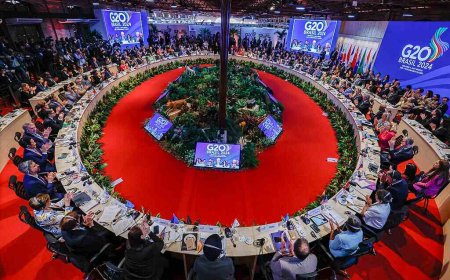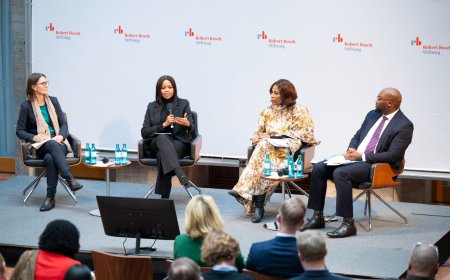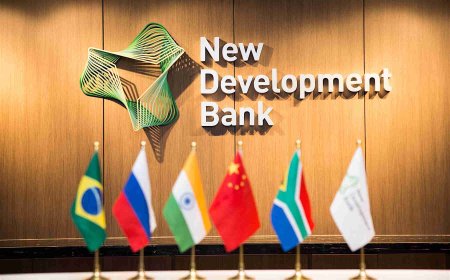This article is part of the BRICS thought leadership series, published by APRI in collaboration with the University of Johannesburg. It explores key themes from the 16th BRICS Summit and the group's broader initiatives. The series is edited by Ada Mare, Bhaso Ndzendze, Serwah Prempeh.
Introduction
This study explores the paradigm shift presented by the new world order and how the facets of the changing dynamics of world politics continue to influence international law, and examines how the expansion of the BRICS bloc influences actors in the international space to strategically place themselves as moral and responsible actors. The argument concurs with the theories of post international theory in international relations and the rise of heterarchy and deepens our understanding of the current shifts in international law.
This piece explores the proponents of international law and the BRICS bloc through the South Africa-Israel case at the International Court of Justice (ICJ). It specifically aims to review the influence of BRICS from an international law perspective. The significance of framing the piece from this angle stems from gauging the influence and reforms set to be ushered in by the growing influence of the intergovernmental group. The assessments further illuminate international relations, the changing global order and geopolitics. Proponents of heterarchy assume that there is a growing number of influential players in the international arena, such as the BRICS bloc. Examining these different spheres of influence can aid in forecasting shifts resulting from the group’s impact on the international, geopolitical paradigm. The bloc's expansion connotes the combined demographics and GDP of the BRICS countries. It further alludes to an ideological shift influencing how the BRICS states conduct their international relations.
Background: BRICS is an ideology that seeks to create a multilateral global system
The growth and expansion of the Brazil, Russia, India, China and South Africa (BRICS) intergovernmental organisation has presented an alternative form of world cooperation. This new ideological paradigm seeks to challenge the global, unipolar system by accentuating, recognising and leveraging the role of Global South countries and emerging economies in economic corporation, trade, infrastructural development and peace and security. The bloc is led by principles of sovereign equality, strategic cooperation, inclusiveness and, most importantly, multilateralism. One common factor amongst the BRICS nations is how all these states are hegemony in their respective continents and regions. As such, they have become a proportional representation of states from these regions. With such collective power, the states have become a much less coercive alternative that seeks to grow the influence of emerging economies and the Global South community. Much of the bloc’s foundation is grounded in the criticism they have echoed towards the Bretton Wood institutions and the unipolar dominance system of the Western states. However, the dominant actors have pushed back against the challenge of this unipolar system. Hence, world politics has been volatile in recent years. This volatility can be attributed to the clash of state interests, non-state actors and international norms. This is further understood within the facets of postinternationalism and heterarchy.
In challenging the unipolar system, BRICS has distinguished itself as a key player. This is evident in its approach, which can be characterised as soft power. As stipulated in their guiding principles, these countries have chosen to counter the dominant states by using less coercion toward fulfilling their national interests. Through these approaches, BRICS seeks to leverage and grow their countries in the context of the international community. Therefore, through its growth strategy and evolution, the bloc is emerging as an ideological paradigm which appeals most to emerging economies, the Global South and developing nations.
The dominance of BRICS countries is anchored in the perceived shortcomings and shortfalls of the global unipolar system, which the USA and European nations mostly dominate. The inauguration of new members at the 2024 summit alludes to several factors that influence the bloc and global politics. Firstly, the summit and its expansion mark the growing influence of the group among a number of states that share ambitions towards a multipolar system. This may trigger a new wave of Cold War ideological contestations or a Thucydides Trap. Secondly, the fact that Russia was the host country of the 2024 BRICS summit indicates a degree of hypocrisy within the bloc, bearing in mind the almost three-year Russia-Ukraine war. The silence from the bloc amid the atrocities in Ukraine demonstrates its inconsistent, separationist approach towards global challenges. As much as the intergovernmental organisation claims to comply with the principles of international law, especially in international peace and security, the group's actions indicate how their interests determine their responses to global challenges. This is further exacerbated by the non-alignment of South Africa with the UN’s Russia-Ukraine war resolution. At a larger scale, these aspects pertain to the discourse of power politics as a challenging factor in realising international law and ensuring consistency amongst states.
Postinternationalism and heterarchy
Postinternational theory and heterarchy approaches aid our understanding of world politics and play a critical role in gauging the changing dynamics of world politics and international law. Postinternationalism is defined as a pattern of world politics and trends sustained by non-state actors, international normative systems and the processes of globalisation. James N. Rosenau is recognised as the father of the post international theory (also referred to as the ‘turbulence paradigm’). He argues that world politics unfolds without the direct involvement of states, moving away from the classic international relations theories (realism, liberalism and constructivism) in elucidating world politics. Postinternational theory argues that the changing precepts of global politics have become too complex and intersectional to be solely defined within a single IR theory or paradigm. Instead, postinternationalism emphasises the role of non-state actors in configuring contemporary global politics as we know it.
Heterarchy is the ‘co-existence and conflict between differently structured micro- and meso- quasi-hierarchies. These compete with one another and overlap not only across borders but also across economic-financial sectors and social groupings’. A governing global system with multiple governing principles characterises a multi-nodal world in which heterarchy is inevitable. The theory is hailed for its ability to cut across the complex and intertwined web of global institutions, guiding ideologies, state actors driven by realism, global conflicts and the roles of non-state actors. The co-existence of these stakeholders and their contrasting views in the international community has given rise to a volatile world. On the other hand, heterarchy is harnessed to empower strategically situated players, especially those with substantial economic resources in a multi-nodal system who seek to leverage their momentum and influence in the global system.
International law and the BRICS effect
Since its establishment, BRICS has sought to alter the global system. The realm of international norms and laws has not been exempted from these reconfigurations. BRICS has significantly influenced international law and its normative systems and emphasises the importance of a multilateral approach towards solving global challenges through international law and its institutions. The BRICS effect in international law is nuanced, manifesting in economic trade, human rights, peace and security, and world development.
International law and its institutions have been criticised for serving the interests of Western states. Therefore, international law helps to reinforce the status quo of a unipolar world system. However, the robustness of this unipolar system has given rise to new prominent actors (i.e. BRICS) who continue to exemplify how a less coercive multilateral global system can represent all different states and actors. Amid the Israel-Palestine war, the South African case against Israel at the ICJ exemplifies the BRICS effect on international law and its institutions. In this instance, a global law court was used by a BRICS country to test the unipolar system of the UN by opening a case against an ally of the USA.
Here, the overlap between realism, postinternationalism and heterarchy is at play. This demonstrates that classic international relations theories cannot fathom the intricate web of international law and power politics from which the conflict of international norms and different hierarchies has emerged. Interestingly, BRICS opted for more key players and responsible actor positions, strategically positioning themselves as moral actors. The bloc’s soft power and multilateral approach toward altering the world system continues to legitimise their cause and agenda.
South Africa as a diplomatic actor and norm entrepreneur
Through the ICJ case, South Africa has leveraged and drawn strict inferences on its soft power and diplomacy. The case has provoked numerous reactions: South Africa has been labelled antisemitic; at the same time it has received massive support from multiple emerging economies, including Bangladesh and Namibia, who regard the country as a moral and responsible emerging actor. Through this case, South Africa could shed its perceived identity as a passive bystander or an instigator of war. The ICJ case has altered the foreign policy landscape of South Africa and has further tested the unipolar system of the UN. Through these points of analysis, it can be deduced that South Africa once again seeks to be labelled as a critical player in the new world order and to enhance its legitimacy and its heroic, hegemonic title beyond the African continent.
Herein, we are exposed to the synchronised interplay of postinternationalism and the rise of heterarchy and witness the co-existence of, and conflict between, multiple hierarchies in the globalised, interconnected world. Firstly, by challenging the unipolar system, the UN court, as a supposedly unbiased entity that sees through the interests of every country without the influence of power politics, is being tested. Secondly, we are exposed to a series of international norms and regional ideologies shaping global politics: As BRICS has illuminated an alternative structure towards world cooperation and politics, several countries are being enticed to adopt and harness multilateralism as the most appealing paradigm of world politics. Third, heterarchy is demonstrated through South Africa's position as a moral actor through the ICJ case. Diplomatically, the case has shown how global conflict resolution should and can be addressed in a multilateral world, meanwhile earning South Africa recognition as a responsible and moral actor. South Africa has again used this case to enhance its legitimacy beyond the African continent. This concurs with the ideals of heterarchy, where strategically positioned actors are empowered to extend their influence and power in the global arena.
It is no secret that countries constantly seek to enhance and maximise their power and sovereignty. However, an interesting point that has emerged with the evolution of international relations is the methods countries have adopted to enhance their power and influence on the global stage. The analysis asserted here aims to demonstrate how countries will always respond to transnational or global conflicts in a manner that suits their national interest. However, this perspective does not dismiss the fact that countries respond through hard or soft power for peace and security matters. Instead, the argument is that action taken by states to respond and assist in conflicts abroad can be regarded as a diplomatic strategy to both achieve peace and security and enhance the legitimacy of their country.
The BRICS summit and the surmised heterarchy exhibited by BRICS member states indicate how the intergovernmental organisation will adopt international law to further its ambitions for multipolarity and influence on global politics. The latter also speaks to BRICS-Africa relations, where many African states perceive the group as a more suitable exemplar on the global stage, boosting the footprint of the bloc and the new world order. The summit provided an opportunity for emerging states to strengthen relations and realign their ambitions for multipolarity. At the same time, it delineated how the bloc can remain a strategic player in the changing international arena and avoid inheriting a system never designed for their development.
About the author
Ndzalama Mathebula
Ndzalama Mathebula is an Assistant Lecturer at the Department of Politics and International Relations, University of Johannesburg. She’s also a PhD candidate at the Wits School of Governance. Her key research niches are international law, political risk, energy, political economy and IR. She writes in her capacity.
